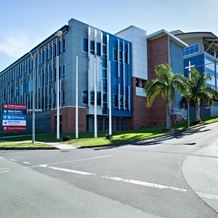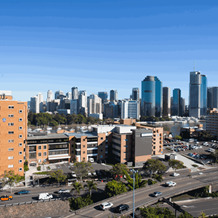St Vincent’s ‘Private Hospital faculty’ of cancer experts engages with GPs and their patients in the battle with rising cancer rates
St Vincent's Private Hospital Northside & Brisbane
St Vincent’s Private Hospital is this weekend assembling a faculty of cancer experts to help GPs who are at the frontline in the battle with rising rates of cancer in Australia.
Over 40 cancer experts and specialists covering many topics and many types of cancer – including gastrointestinal, colorectal, liver, lung, breast and prostate cancer - today collaborated with their GP colleagues in a series of highly interactive, educational insights that focusses on diagnostic, referral and treatment pathways, as well as survivorship and palliative care.
Cancer rates continue to rise across Australia – especially in younger people, particularly men - with an estimated 169,000 cases set to be diagnosed this year, an increase of around 93% since 2000.
By 2034, with an increasing and ageing population, it’s estimated there will be over 200,000 cases of cancer diagnosed annually in Australia, according to the Australian Institute of Health and Welfare.
While older males remain more likely to be diagnosed with cancer, it’s becoming more commonly diagnosed in people in their 30s and 40s. While experts aren’t sure why, they believe ‘lifestyle factors’ are mostly to blame. The good news is that more people are ‘beating cancer’ with the five year survival rate increasing to 71%, up from 55% in 1995.
Click below to view Professor Benedict Devereaux's interview with ABC Brisbane Radio's Breakfast team.


Early detection remains the critical factor in surviving cancer
St Vincent’s Private Hospital symposium co-chair, Professor Benedict Devereaux, says there were some practical steps all people could take to help them to detect cancer early.
Professor Devereaux is co-chair of the symposium, a past-president of the Gastroenterological Society of Australia as well as a gastroenterologist at St Vincent’s Private Hospital Northside.
“St Vincent’s Private Hospital has assembled a stellar line-up of esteemed specialists for this cancer symposium and it’s important that we’re able to be in the same room with our GP colleagues for a day and to share real world cases and experiences to help build their skills and knowledge which ideally helps them and their patients with early detection and management of cancer,” says Professor Devereaux.
“St Vincent’s Private Hospitals Northside and Brisbane provide a comprehensive range of experts in various fields of cancer diagnosis, treatment and research who have a multi-disciplinary approach to patient care from detection, oncology and surgical intervention, post-operative care, and (if required) palliative care.
“We all read and hear a lot about cancer and people’s reaction can range from apathy to fear. But I would suggest it’s helpful for people to adopt a Top Five checklist to assist them with being vigilant for any early symptoms and to help ensure early detection.
“The first is to listen to your body and note any signs or symptoms that are unusual or haven’t been present before – that can be simple things like fatigue or unexplained weight loss or unusual pain. Also note what comes out of your body – changes in bowel movements, the presence of blood in your bowels or urine.
Secondly, it’s important to note and know your personal risk factors – that covers everything from your age, weight (obesity), what you eat and drink and how much, if you’re a smoker and exposure to sunlight or radiation.
“Thirdly, it’s very important to know your family history and if anyone has been diagnosed with cancer including aunts and uncles, cousins and grandparents. Review that every two years in case family members have been newly diagnosed. This is a known risk factor.
“You also need to ensure that you get regular cancer screenings – for some women aged 40 to 50 breast cancer screenings are free (for an average risk women, breast cancer screening starts at 50) and for men they should be getting a PSA test, with guidelines suggesting they do that from the age of 50, while the free bowel cancer screening now starts at age 45 and is free every two years up to age 74.
“And finally, you should book in with your GP (ideally your regular GP) for an annual health review where they can do or order a whole range of tests or screenings and ideally compare results now to your levels or what’s happened in the past. If you’re especially concerned about your cancer risk, you can even ask them for a personalised cancer risk review which is a more targeted health review.”
TOP FIVE CHECKLIST
1. Listen to your body and note any changes in bodily functions
2. Know your personal risk factors (age, weight, diet, smoking/drinking, physical activity)
3. Know your family history
4. Get regular cancer screenings
5. See your GP for an annual health review
A Brisbane husband and wife who were both diagnosed with cancer – which was detected by visits to the GP - have both beaten cancer against the odds!
Giovanni and Trish Porta, aged in their 60s, were in the final throes of packing their suitcase for the ‘trip of a lifetime’ to Europe in May last year.
Three days before their flight, Giovanni finally succumbed to Trish’s concerns and went to see his GP to get some blood tests and hopefully receive some answers to that persistent flu-like virus which he couldn’t shake!
“It seemed like I had a virus or flu for over 12 months leading into 2023 and I just thought the blood tests might show that my immune system was a bit out of whack – but I was shocked when the results and the diagnosis came back,” says Giovanni.

The diagnosis put him in selective, albeit unwanted company – with a rare form of deadly blood cancer, Acute Promyelocytic Leukaemia (APML) – which less than 100 Australians are diagnosed with every year.
In most cases, the causes of APML remain largely unknown but it is thought to result from damage to one or more of the genes that normally control blood cell development. Doctors believe APML patients don’t inherit the genetic mutation (change) and for some reason it just happens randomly to people often aged in their 30s and older.
For Giovanni - a healthy Brisbane lawyer, frontman and drummer in his own band, former teacher, father, grandfather and now volunteer at St Vincent’s Private Hospital Northside – it meant the cancellation of the overseas holiday and an immediate and gruelling 120-day oncology treatment. He stayed in St Vincent’s Private Hospital for four weeks to undergo chemotherapy treatment five-days a week, followed by another 80 days of treatment as an outpatient.
His hospitalisation for two months of treatment was precautionary as patients with APML are at a risk of side effects resulting from clotting and bleeding problems with the risks at their greatest during the first two to four weeks of treatment.
Giovanni found himself “in the same chair, in the same oncology ward” at St Vincent’s Private Hospital Northside as his wife Trish who underwent chemotherapy 10 years earlier for what doctors told her was ‘inoperable stomach cancer’.

“Life takes some funny turns sometimes and to find that I was treading the same perilous health journey a decade after my wife was pretty extraordinary,” says Giovanni.
“Thankfully she and I both survived the battle with cancer and is all good now. It was a pretty challenging time for both of us but I’m a man of faith and prayer which certainly helped me through the darkest of times.
“My doctors told me that 15 years ago I probably wouldn’t have survived this form of blood cancer, so I feel like I was lucky to get it now, when I was in my 60s and not 20 years ago, when I was in my 40s.
“These days I’m very aware of any changes in my body and the way I feel. I guess you could say I’ve gone from being a bit negligent to totally vigilant and I would urge all men to ignore those ‘macho, tough it out’ approach to symptoms, prioritise their health and get to their GP if they have any concerns or risk factors!”
Associate Professor Joel Rhee is Chair of RACGP Specific Interest Cancer and Palliative Care and says that while GPs are very much on the lookout for cancer symptoms in their patients, they have to balance the decision to send patients for any further investigative tests (such as scans and blood tests) with ensuring that patients are appropriately investigated.
“It becomes a balancing act for GPs with the vigilance of looking for any early warning symptoms of cancer that the patient might disclose or the GP might detect with the fact that you can’t send everyone for scans because tests are not without harm, for example, radiations from scans can cause cancer, procedures are not risk-free, and the health system simply couldn’t cope with that demand if every patient with every symptom was sent for a scan,” he says.
“It becomes a bit more problematic with the cohort of people where cancer rates have historically been lower, but which are now rapidly rising, such as people under 50. GPs shouldn’t discount the possibility of cancer because of someone’s age – there shouldn’t be ‘age bias.’
“There’s not a simple solution but this is where GPs’ training, experience and expertise as the primary diagnosticians in the Australian healthcare systems comes in handy.
GPs are trained to have a high index of suspicion for serious illnesses including cancers, and will take a careful history and conduct a physical examination to determine the next cause of action which may include further testing or referral to a specialist for further evaluation.
“GPs’ ability to do this well is enhanced by having a strong trusting partnership with the patient, hence it is important for patients to find a regular GP that they trust.”
Assoc Prof Rhee says some medical conditions increase the risk of certain cancers, so it is important to be aware of them – for example, people with inflammatory bowel disease are at increased risk of bowel cancer.
.jpg?mode=crop&width=515&height=550&quality=80)
- Home
- Patient News
- St Vincent’s cancer experts engage with GPs in the battle against rising cancer rates




